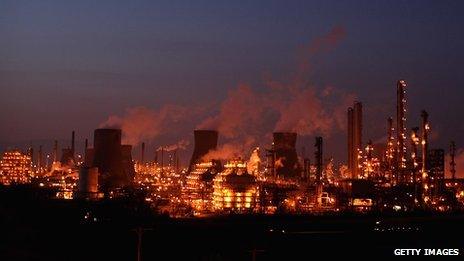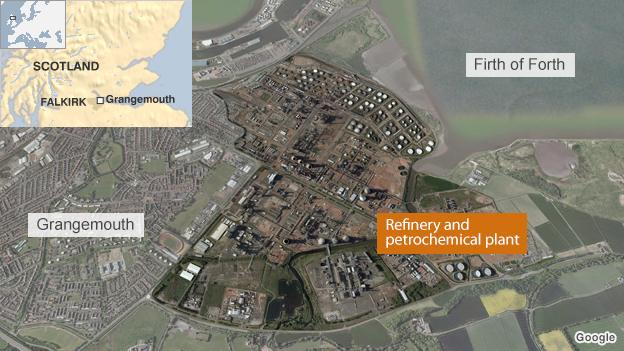Why Grangemouth matters
- Published
Grangemouth dispute
- 1,700-acre site
- 1,370 staff - 800 jobs affected
- 2,000 contractors employed
- 10,000 jobs rely on site
- Estimated to be 8% of Scotland's manufacturing industry
- Supplies 70% of fuel used at Scotland's filling stations
- Petrochemicals plant manufactures 2m tonnes of products every year
- Refinery processes 200,000 barrels of crude oil every day
Ineos says the petrochemical plant at Grangemouth will reopen with immediate effect, after resolving a bitter dispute with employees.
The dispute had led to the company announcing the permanent closure of the plant, affecting 800 jobs and threatening more. In total, Grangemouth employs 1,370 staff.
The petrochemicals plant and the refinery are key parts of the Scottish and UK economy.
Scottish fuel supplies
The Grangemouth refinery supplies 70% of the fuel used at Scotland's filling stations and it also supplies fuel to Northern Ireland and the North of England.
Contingency plans were being made to replace petrol and diesel supplies, had the refinery closed, and experts say that fuel could have been sourced from elsewhere.
"With petrol and diesel supplies, unless there is panic buying, there should not be a problem as there are plenty of imports," says Alexander Kemp, professor of petroleum economics at the University of Aberdeen.
UK refining capacity

Grangemouth has been hit by cheap fuel imports from the US
The number of refineries in the UK has been falling for decades. At the moment, there are seven.
Coryton in Essex was the most recent to close after its owner, Petroplus, filed for bankruptcy in 2012.
But analysts say there is still overcapacity in Western Europe and the situation has been made worse recently by cheap fuel imports from the United States.
US refineries pay about $15 a barrel less than UK refineries for crude oil, which has helped US firms to export cheap fuel to the UK.
But Prof Kemp says there is a longer term issue of energy security for the UK as "we can't always rely on cheap imports of fuel".
At the moment, the UK imports 47% of the diesel and 50% of the aviation fuel it needs.
But for petrol, there is currently a 20% oversupply, according to figures from research group IHS Purvin & Getz.
Its research shows that if two refineries were to close down, the UK would rely on imports for more than 70% of its diesel and jet fuel and more than 20% of its petrol.
Scottish Economy
Grangemouth is an important employer and the 800 jobs that would have been affected by the closure of the petrochemicals plant would have been a big loss.
Along with the refinery, Grangemouth employs another 2,000 contractors and the refinery's owner, Ineos, estimates that 10,000 jobs indirectly rely on the site.
Thanks to the refinery and the associated chemicals business, the Falkirk area employs more people in manufacturing than the rest of Scotland combined.
"It's actually a fundamental part of the infrastructure of the chemical, petrochemical and plastics industries of the UK and it would be madness to have it shut down," said the local Labour MP, Michael Connarty.
But Ineos says the business is losing £10m a month and needs an investment of £300m.
Forties pipeline system
The Forties pipeline delivers a third of the UK's oil output.
The steam and power which runs the pipeline and BP's Kinneil terminal comes from Grangemouth.
At the moment, the supply of steam and power has not been interrupted and Ineos and union workers have been keen to maintain supplies.
But had Grangemouth's refinery been forced to close, then it is not clear what would have happened next.
A strike at Grangemouth in 2008 shut the Kinneil terminal and that forced 70 North Sea oil platforms to shut down or reduce production.
Refinery operations

PetroChina owns half the refinery which is operated by Ineos.
It can process 210,000 barrels of crude daily.
Ineos also owns the petrochemical plant, which is due to close.
- Published22 October 2013
- Published19 October 2013
- Published16 October 2013
- Published21 October 2013